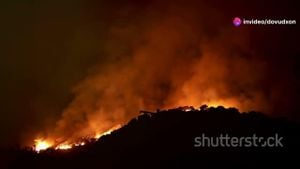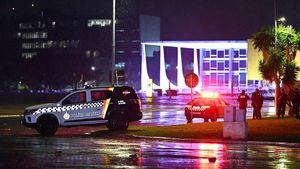Russia is under the spotlight once again due to the case of Nadezhda Buyanova, a 68-year-old pediatrician sentenced to five and a half years in prison after comments she allegedly made about the war in Ukraine. Buyanova's case marks another chilling example of the Russian government’s aggressive crackdown on dissent and criticism of its military actions.
The situation unfolded earlier this year when Anastasia Akinshina, the mother of one of Buyanova's patients, accused the doctor of making disparaging remarks about her son’s father, who had died fighting for Russia. During what should have been a neutral medical consultation, Akinshina alleged Buyanova claimed the deceased soldier was “a legitimate target” for Ukrainian forces. This allegation was taken seriously by authorities who have grown increasingly intolerant of anything viewed as promoting anti-government sentiment.
Buyanova was arrested in February amid the frenzy of rising tensions and nationalistic fervor, fueled largely by the Kremlin’s response to the escalation of its military campaign against Ukraine. Following her arrest, her legal troubles began to mount quickly. She was charged with "spreading false information"—a criminal act introduced shortly after the war escalated and aimed at silencing dissenting voices.
Despite her claims of innocence, which included the assertion she never discussed the war with her young patient, the prosecution leaned heavily upon the testimony of the child. Although the court did not allow the boy to appear live during the trial, it used the account generated from his pretrial interrogation. Defense lawyer Leonid Solovyev questioned the credibility of the child’s testimony, arguing the phrasing used was beyond the comprehension of someone of such young age.
“Those phrases like ‘legitimate target’ and ‘aggression’ — I very much doubt a young child can say those, let alone recall and repeat them,” Solovyev stated. This raises significant concerns over the fairness of the trial and the motivations behind the mother’s accusations, as detractors claim Akinshina's actions were rooted more in personal animosity than factual grounds.
The aftermath of the sentencing ignited public outrage, with many citizens rallying behind Buyanova. Supporters organized petitions calling for her release, garnering over 6,500 signatures. Many expressed shock and disbelief at the severity of the ruling, underscoring the draconian measures being employed by the Russian authorities against anyone perceived as criticizing the government.
“The sentence is monstrously harsh,” Buyanova’s attorney, Oskar Cherdzhiyev, remarked, encapsulating the disbelief surrounding the verdict. Supporting voices echoed similar sentiments, with one of Buyanova’s supporters exclaiming, “Five-and-a-half years! She’s been sent to a penal colony for five-and-a-half years!” Such declarations signal deep-seated concerns about the erosion of civil liberties under the current regime.
This landmark case is part of a broader trend of repression within Russia. Since the Ukraine invasion began, over 1,000 individuals have been implicated under laws prohibiting dissent against the military. Instances of criminal proceedings for remarks deemed anti-war have proliferated. For example, French researcher Laurent Vinatier received three years after allegedly gathering military data, another conviction fueling fears of authoritarian overreach.
Rights advocates have decried the use of previously established laws to intimidate and punish citizens, particularly those working within the healthcare sector. An open letter was circulated among medical professionals denouncing the verdict against Buyanova, stating it sends the damaging message to young doctors: stay silent or risk being punished.
Critics of the Russian government suggest the case of Nadezhda Buyanova illuminates systemic issues facing dissenters across various domains. Her story is reminiscent of many others who have faced severe penalties for mere words or opinions. Prominent figures, including journalists and artists, have also been subjected to similar fates for opposing government narratives.
This singular event has managed to encapsulate the intertwining realities of personal tragedy and broader political ramifications—it is not simply the tale of one doctor’s imprisonment but part of the fabric of life under rising authoritarianism where free expression is becoming increasingly perilous.
The fierce backlash against Buyanova is reflective of the heightened atmosphere of fear—the consequences of dissent run deep and can transform lives within moments. Her conviction has served as both warning and wake-up call to Russian citizens: the cost of critiquing the government can be exorbitantly high.
The society at large continues to grapple with the repercussions of the legal precedent set by the Buyanova case. The chilling effect stretches far beyond her individual sentencing, influencing public discourse, silencing voices of reason, and stifling much-needed conversations about the realities of the war and its domestic impacts.
With so much at stake, citizens are left pondering their place within this new social contract, feeling the intense pressure of complying with increasingly repressive measures imposed by those they once believed would uphold freedom of expression. What remains to be seen is how far-reaching the consequences of this incident will be as both Buyanova and the broader community navigate this precarious new reality together.
For now, Buyanova awaits her transfer to the penal colony, where life's harsh trials are likely to compound her already fraught situation. Adversity may well define her existence for the foreseeable future, but as history has shown, the undeterred spirit of individuals like her may yet shine through, inspiring others to challenge the prevailing order against all odds.



